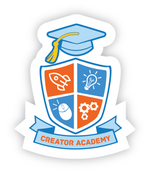Today we interview Elise Bohan, our newest educator at Creator Academy.
Hi Elise! Tell us about what you’re researching
Hi there! I’m currently completing a Ph.D. dissertation on transhumanist ideas and technologies. These game-changing technologies include robotics, artificial intelligence, nanotechnology, virtual reality, genomics and other biotechnologies. My primary interest is in exploring the social and philosophical impacts these technologies will have in our lifetimes and in the lifetimes of our children.

Tell us about your teaching experience
I have many years of experience teaching students of all ages and backgrounds. My teaching CV runs the gamut from one on one private tuition at the tertiary level, to speciality tuition for children with cognitive processing disorders, working with primary aged refugee students in Western Sydney primary schools, teaching middle school English classes in the Sichuan province of China, and tutoring on a flagship undergraduate course on the history of science, technology and humanity (Big History) at Macquarie University. I have also provided two videoed guest lectures on artificial intelligence for two different online curriculum platforms, both of which were developed by Macquarie’s Big History Institute.

Of all the teaching you’ve done, what was your most memorable experience?
Teaching at a middle school in China in 2014 was by far the most memorable experience. It was the first time I had taught groups so large (50 students per class!) and it was a fantastic challenge designing new lessons every week that were fun, rigorous and engaging.

Why do you think robotics is important for children?
Robotics is important for everyone in the modern world! But today’s children are very lucky because they are learning to interact with the technologies that will shape their future from the get-go. Having a robot-positive education is particularly important for kids because they will grow up working, socialising, and living in a world where they are and co-operating with ever more intelligent machines. Learning to work with these advanced technologies from a young age can help make children more competitive in a rapidly changing workforce, especially as they learn to design projects and engage in tasks that hone their unique and valuable cognitive skills, like creative and critical thinking. These remarkable human attributes pair up beautifully with the more repetitive manual and computational tasks that our robot friends can help us with.
Thanks Elise!
